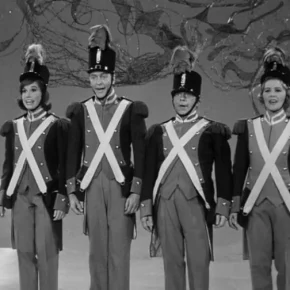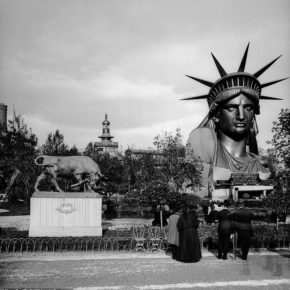Since we last met, I’ve been skiing in Colorado (great time – proper post coming soon, though the new header image is from this trip) and spent a weekend in Chicago, where sprite had her annual meeting (inconveniently planned to occur on her birthday). There are plenty of pics from both adventures over at my Flickr page, so have a look around.
Let’s muse, then:
- So it seems that Chrysler – who already received $4 billion in loans from the TARP fund – needs an additional $5 billion to stay afloat. GM wants another $16.6 billion. Sorry, Detroit dinosaurs, but we need to cut you off. Y’see, I remember how things used to be in the land of business: those that could adapt to changing circumstances survived, while others failed – no bailout needed or expected. Note that you don’t see Studebakers, or Cords, or Nash Ramblers in the dealerships these days – there’s a reason for that, as their parent companies failed. And yes, many people lost their jobs as a result of these failures. But somehow, the United States survived, and the fittest of the automakers lived on to see another day.
The issue, as I see it, is that the “Big Three” of Detroit failed to see the folly of their ways. When customers demanded fuel-efficient and reliable cars, the folks at Ford, GM and Chrysler kept on producing big, hefty, inefficient, unreliable cars that didn’t appeal to many buyers. Sure, there was a certain pride in “buying American” (a trait to which I don’t really subscribe in these modern days), but the buyers looked to the cars that looked forward: Honda and Toyota hybrids, well-engineered German models, and high bang-for-your-buck units from South Korea. All the while, Detroit over-expanded and watered down its offerings.
Even now, the “Big Three” refuse to do a proper culling of their models and workforce to appeal to the modern economy. If they would simply specialize in their unique strengths (Ford = trucks, Chrysler = vans and the basics of the Jeep brand, GM = ummm, something), plus one “character car” (Ford = Mustang, GM = Corvette, Chrysler = Viper or some very-capable Jeep), then perhaps there would be reason to have optimism. And this wouldn’t require any federal funding to happen: it’s just a matter of cutting costs – and personnel – at all levels, top to bottom.
Furthermore, the UAW is standing firm on post-war, sweatshop-based tactics toward job protection, moves that do not endear them to me or to the economic realities of today. Look at the most productive and motivated auto workers these days, and you’ll see that they work for Toyota, Honda, Nissan and BMW – most of which are not beholden to the UAW and its yesteryear-leaning tactics.
- And this leads to my next point: unions need to look long and hard at how their European counterparts handle employment and worker protections. Note that the European labor unions do not rule the roost at the places where they are active. Membership is optional, and you’ll see both union-affiliated and non-union workers standing side-by-side at factories, all happy in their choices. Compare that to the United States, where unions like the UAW create all-or-nothing situations for potential employees.
Unions have served a purpose throughout the history of the United States. They helped improve worker conditions and defend workers’ rights during times of sweatshop tactics and excessive child labor. They helped set proper safety standards, and helped negotiate living wages. Like the “Big Three,” however, most unions in the United States have failed to adapt to the new realities of the market, both locally and globally. They are paranoid and protectionist to a fault, and while there are some that still act as fair players in the grand scheme of business and societal welfare, there are others that fear any change.
- And that brings me to the basic reality that the United States now faces: change. The voters called for it in the 2008 elections, and the current economic crisis demands it of all citizens, rich and poor. The America many have known is a relic of a decadent past, and we need to move forward to a leaner, more efficient, more inclusive and less divisive way of life. It means walking instead of driving to the store, it means less spending on frivolous items, it means setting up the basics that many societies take for granted as true civil rights – universal healthcare being paramount above all else, especially for those 18 and under. It means investing in the future: in post-oil energy, in mass transit and infrastructure improvements that will connect our neighborhoods without requiring low-occupancy cars to get from point to point.
These are all changes to the old “chicken in every pot, two cars in every garage” post-war dream that continues to be bandied about by nostalgia buffs and social conservatives. It was a great dream, but it’s time to wake up to reality – and reality demands that we change our ways. It will involve sacrifice, no doubt. But these changes are simple to integrate into daily life: walk, bus, train or bike to places you would normally drive; use canvas, cloth or reusable composite bags for shopping needs; turn off lights, computers and appliances that aren’t in use; set thermostats lower in the winter and higher in the summer (dressing in layers is chic, after all); eat locally and in season whenever possible; hang dry your clothes. These are just a few things – little things – that most people can, and must, do in order to help enact real, tangible change.
- And speaking of reusable bags, the Trash Free Anacostia movement is one I really support. It calls for a 5 cent fee for any plastic or paper grocery bag issued by a store, thus encouraging reuse of bags instead of introducing them into the ecosystem, where they often end up as waste – in DC’s case, that’s usually in the river ecosystem of the Anacostia and Potomac Rivers.
Frankly, I think a 5 cent fee is too low – it should be more like 35 to 50 cents per bag – and should be used in conjunction with a 5 to 10 cent credit for bringing your own bags to the store. This kind of system works well in Europe (where else?), and has really changed how people shop: they buy only what’s needed, and think about what they realistically can carry. Yet this isn’t necessarily a limitation; rather, it’s a call for personal creativity.
And while people will grouse about this adversely affecting the poor: it’s a one-time charge to get a reusable bag (most retailers change between $1-2 for fairly large, durable bags), and in DC, it’s not difficult to come upon tote bags and duffels, as they’re handed out at myriad free events throughout the District.
So I applaud Councilman Wells’ efforts on this, and am in support of this first step toward a new mindset in American commerce – one bag at a time.















jank
18 February 2009 — 09:52
The cars thing absolutely kills me. And, you’re right on with the unions.
The interesting bit is that, as a gvt employee, I’ve got essentially the situation you’d described as being the case in Europe – there is a union at the lab, but you’re not required to be a member.